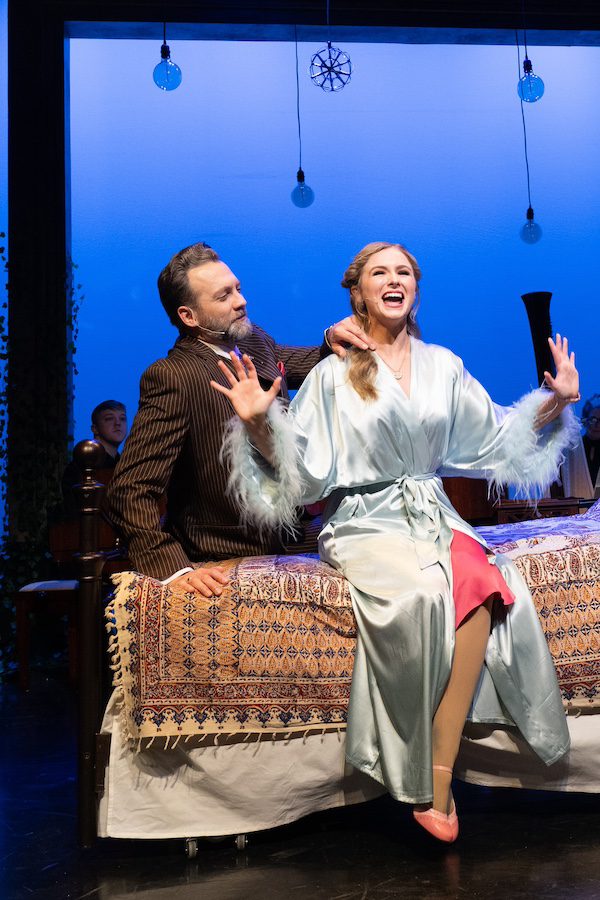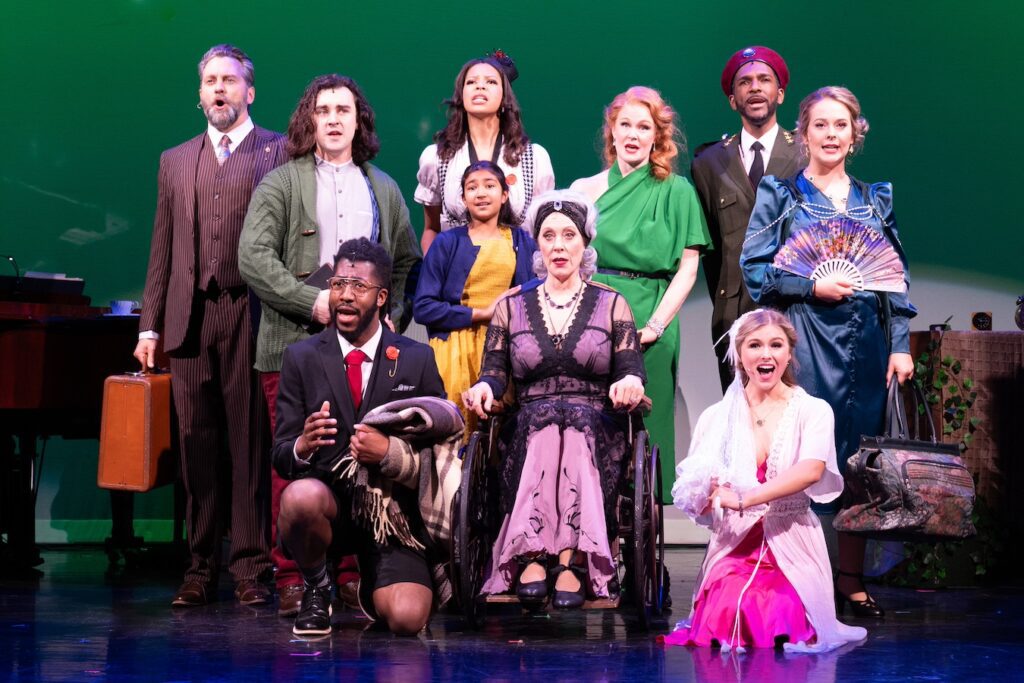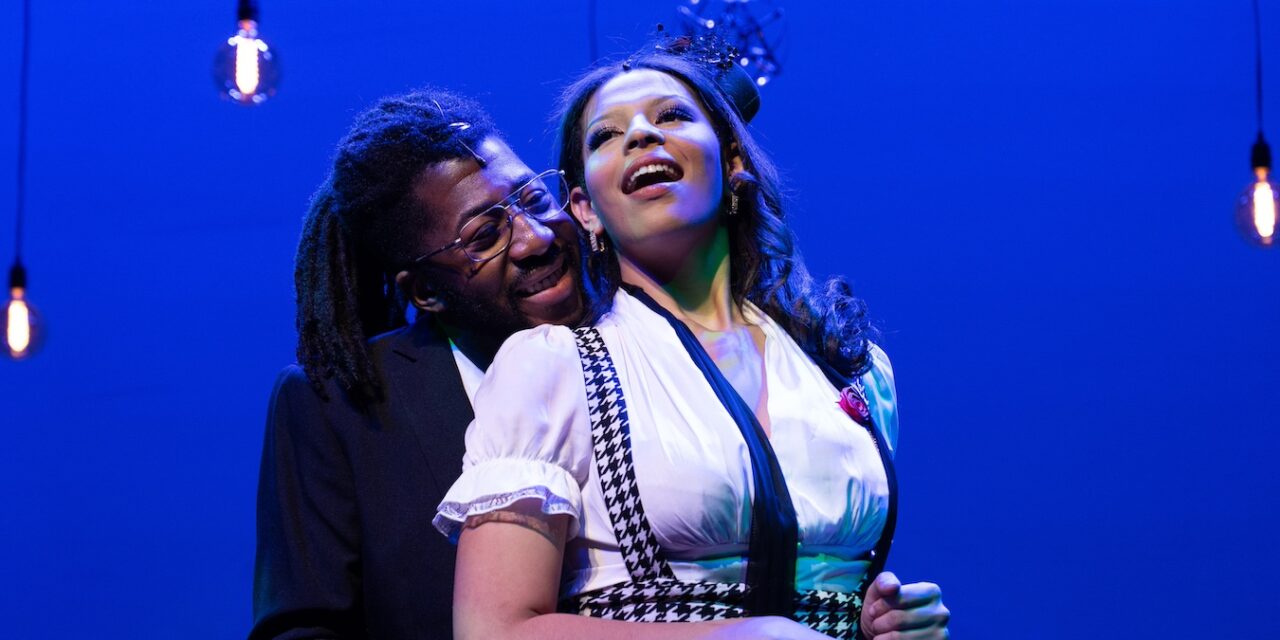Theater Review by Ron Fassler . . . .
It’s hard to believe that it’s been fifty-three years since A Little Night Music first opened on Broadway. Though a teenager at the time and with a few of its more adult themes going over my head, I was still wowed by what was the third Stephen Sondheim/Harold Prince collaboration in just three years—the remarkable triumvirate includes Company and Follies. Creating a trio of stage productions in a row to match it, one has to go all the way back to As You Like It, Julius Caesar and Hamlet first performed between 1599 and 1600. Then again, Shakespeare never rhymed “submerge in” and “virgin,” as Sondheim did in Night Music. Combined with a literate and witty libretto by Hugh Wheeler, its sterling reputation has remained intact for more than half a century. Having seen it in a number of productions over that period, I always find something new to glean from it. The American Theater Group, in a briefly rehearsed yet satisfying production that opened this weekend at the Sieminski Theatre in Basking Ridge, New Jersey, made the 45 minute drive in a pounding rainstorm on Saturday worth it. It was a joy to submit to this musical’s multiple charms and revel once again in its intricate and humorous wordplay.

Every Night Music must have a Desiree Armfeldt to anchor its depth of feeling. As the middle-aged actress weary of the demands of her profession, confused about where she is going, and worried about the future, the challenge is to make every moment count. It’s not a big part compared to more demanding leading roles, but she is the core strength at its center. And with only three songs (a group number, a duet and a solo), it certainly makes the case for quality over quantity. I mean, is there a better late Act II soliloquy than “Send in the Clowns?” In Kate Baldwin, someone who lights up the stage before she even opens her mouth, Desiree comes to glamorous life. Whether purring a bon mot or singing with an openness and clarity that forces you to sit upright in your seat, Baldwin is absolutely captivating. She is both simple and charming, never more so than when playing opposite her real-life husband Graham Rowat as Frederick Eger man, the sedate lawyer with whom Desiree once had a fling a dozen years earlier. Together they create sparks and heat up the play’s romantic temperature a few degrees whenever they share a scene.
Based on Ingmar Bergman’s 1955 comedy Smiles of a Summer Night (yes, he once made a comedy), Night Music involves a roundelay of mismatched couples in turn-of-the-century Sweden. Its original production had striking scenery by Boris Aronson and sumptuous costumes by Florence Klotz, neither of which are attempted in Hunter Foster’s pared-down version here. Shrinking the cast from its original 18 to 12, the five-person Liebeslieder singers have been eliminated and replaced by some of the principal players performing double duty. It works, and makes the show more producible in the current climate of shrinking budgets (it was done with the permission of the authors’ estates). Foster is onto something with his minimal staging which, in its stripped-down way, satisfies the craving to feast upon the meat on its bones even without the benefits of the usual fancy serving.


Using both Equity professionals and non-union actors, the results don’t always make for a level playing field, but in this case, sincerity goes a long way in not leaving anyone stranded. There is some lovely work from Lillie Langston—a recent graduate of the University of Arizona’s BFA Musical Theatre Program—whose child bride of Anne Egerman positively shimmers with sexual anxiety and tension. I also enjoyed the sassy and bawdy quality of Alyssa Wray’s Petra, the wench who gets to sing “The Miller’s Son,” one of Sondheim’s most difficult numbers to pull off. However, she would be better served by not starting the song at such a frenzied pitch, leaving her with little room to build it properly. Benjamin H. Moore falls into the trap of pushing a bit too hard with his Count Carl-Magnus and Abby Middleton scores, with much of the full-proof dialogue written for Countess Charlotte, even if more time in front of an audience will probably help improve her overall timing. Ruth Gottschall makes the unfortunate decision of playing Madame Armfeldt with far too much robust vitality. She brings the necessary bite to her choicest lines but lacks the subtle intonations of someone close to the end of life.


A piano, harp and cello are all that consist of the orchestra to play the sensational score, which it does with efficiency under the supervision of Keith Levenson and musical director Mason Margut. With little scenery, Seth Howard manages to make up for it with a succession of easily movable props. The lighting by Douglas Macur is suitable, and the eclectic mix of costumes by Nicole V. Moody does fine, none better than Baldwin’s, which she wears beautifully.
All in all, this is a worthy production of one of the best musicals of the second half of the 20th century. Though the Basking Ridge engagement has ended, it runs March 14-24 at the Union County Performing Arts Center in Rahway on the Hamilton Stage. So, if you’ve never seen A Little Night Music, remember that you don’t need a passport to go to New Jersey. I recommend it for more than a little night’s entertainment.
A Little Night Music. Played March 9-12 at the Sieminski Theater (Basking Ridge, NJ). Will play March 14-24 at the Union County Performing Arts Center’s Hamilton Stage (360 Hamilton Street, Rahway, NJ). www.ucpac.org
Photos: Lianne Schoenwiesner, Spotlights Photography


















